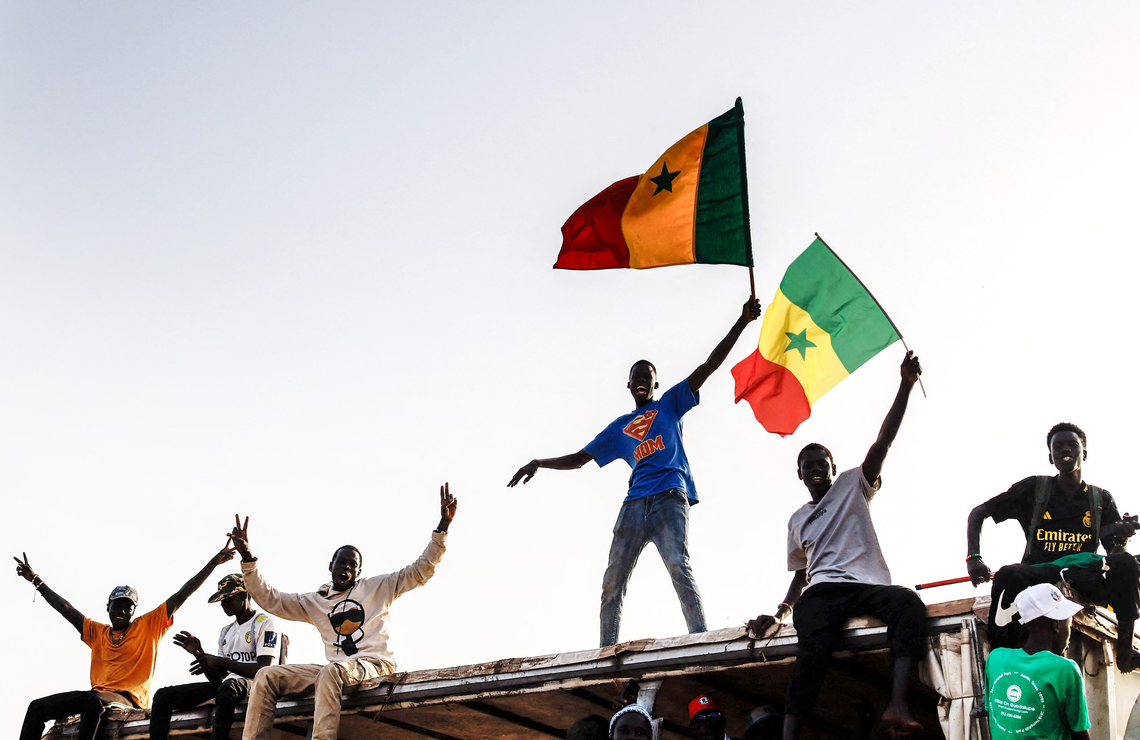
The Senegal Revolution
The 24 March election heralded a profound generational, social and political turning point. A rejection, as it were, of a model of economic emergence and "liberal" governance that only benefited the ‘elite’. It's a historic moment and a huge challenge for President Bassirou Diomaye Faye and his mentor Ousmane Sonko, now Prime Minister. Expectations will have to be met, while at the same time dealing with economic and strategic realities. We delve into the details.
HISTORIC ELECTION
HE WAS Plan B, Ousmane Sonko's right-hand man, the one who was supposed to carry the message of the charismatic leader barred by a Constitutional Council ruling from standing. Bassirou Diomaye Faye has never held elected office (his one attempt to run for mayor of his home town in January 2022 was barely convincing...). He had just spent eleven months in prison and was released under an amnesty law, demanded and passed by outgoing president Macky Sall, despite being his arch-enemy since 2019. Diomaye Faye and Ousmane Sonko ran a lightning-quick and highly effective campaign, just over a week or so. The incumbent government, worn down by eleven years in office, was divided, riven by egos, weakened by strategic missteps and by its decision to postpone the elections. The presidential coalition's candidate, Amadou Ba, was prevented from standing by his own party. But the country was ready. In social turmoil, waiting for radical change. Senegal wants young blood and egalitarianism. Citizens are calling for a rejection of the elites, of liberal and Western models. With a far-reaching plan for economic and social transformation. Above all, the country wants to believe that all this is possible. That it's not just a dream, that it's not just talk. Diomaye Faye's candidacy and the PASTEF (African Patriots of Senegal for Work, Ethics and Fraternity) programme swept away all the barriers in their path, and the victory was astonishing, clear and unambiguous: just over 54% of the vote in the first round. Senegal underwent a sea change.
DIOMAYE FAYE, PRESIDENT!
At just 44 years of age, he has become the youngest president in Senegal's history. He is also the first polygamous head of state (like Ousmane Sonko), which caused more of a stir abroad than at home, where the practice is commonplace... Diomaye Faye, born in Ndiaganiao, in Serer country (like Macky Sall), comes from a family of modest means. He was born, raised and educated in Senegal and a senior civil servant. He went to the ENA (school of public administration) before joining the tax department (headed by Amadou Ba). It was there, in the tax department, that PASTEF was founded, led by an ambitious and determined young executive, Ousmane Sonko. Sonko, the opponent who was expelled from the civil service in 2016, mobilised the crowds. His confronted the authorities head-on. Bassirou Diomaye Faye, the party's secretary general, worked on the party's project, ideas and organisation. He kept a low profile. Some say he's an Islamist, but he insists he's pious and in tune with Senegalese society. But at the same time open to modern cultures, to rap and flow music that get young people up and dancing.
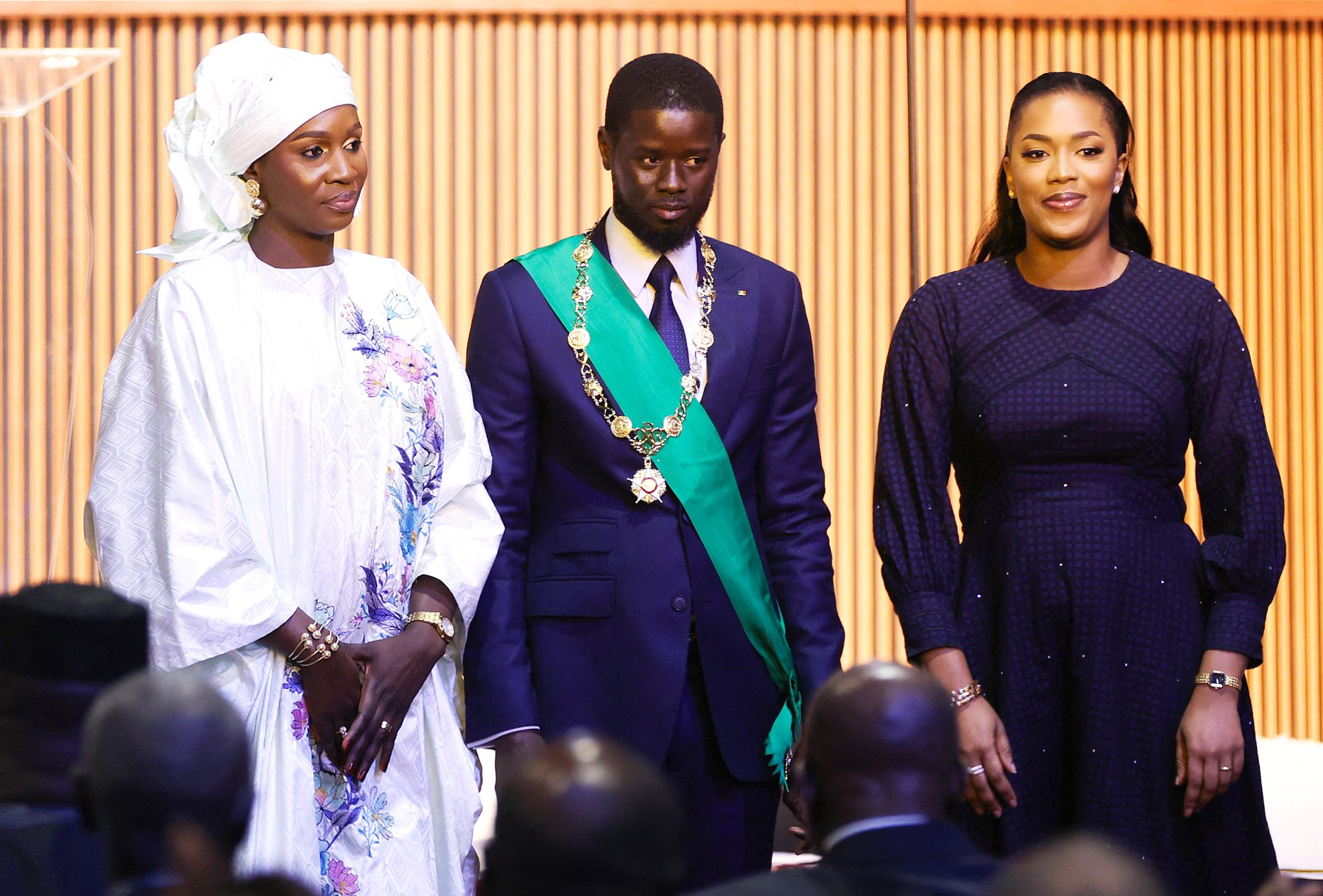
He is discreet by nature, his voice isn't always steady and he's not one for great rhetoric. Yet he campaigned, presenting himself relentlessly, day and night, to the voters who were expecting Ousman. He assumed the role of deputy (the ‘spare’, to borrow the title of Prince Harry's autobiography). He was, as the English say, the right man in the right place, the right person at the right time, the person who benefited from the incredible alignment of the planets. Now he's in the Palace. Now he has to really take on the responsibility of becoming President of a complex, fragile country that is difficult to govern. He's aware, of course, that he is expected to deliver. And he is certainly aware of his inexperience, of the immensity of the task and the responsibilities he has to shoulder.
DUAL CONTROL
PLAN A was, of course, Ousmane Sonko, founder of PASTEF. He had been campaigning since 2016. He ran in the 2019 election (in which he achieved just over 15%). He was the one who took on Macky Sall head-on. His multiple arrests and detentions, in particular following a distressing rape case, led to riots, repression and casualties. It was Ousmane Sonko who decided to encourage alternative presidential candidates in order to “protect the programme”. And it was also Sonko, after a surprising release from prison by Macky Sall's amnesty law, who galvanised the campaign. So the win is first and foremost his. He is the leader. But he is not the president.
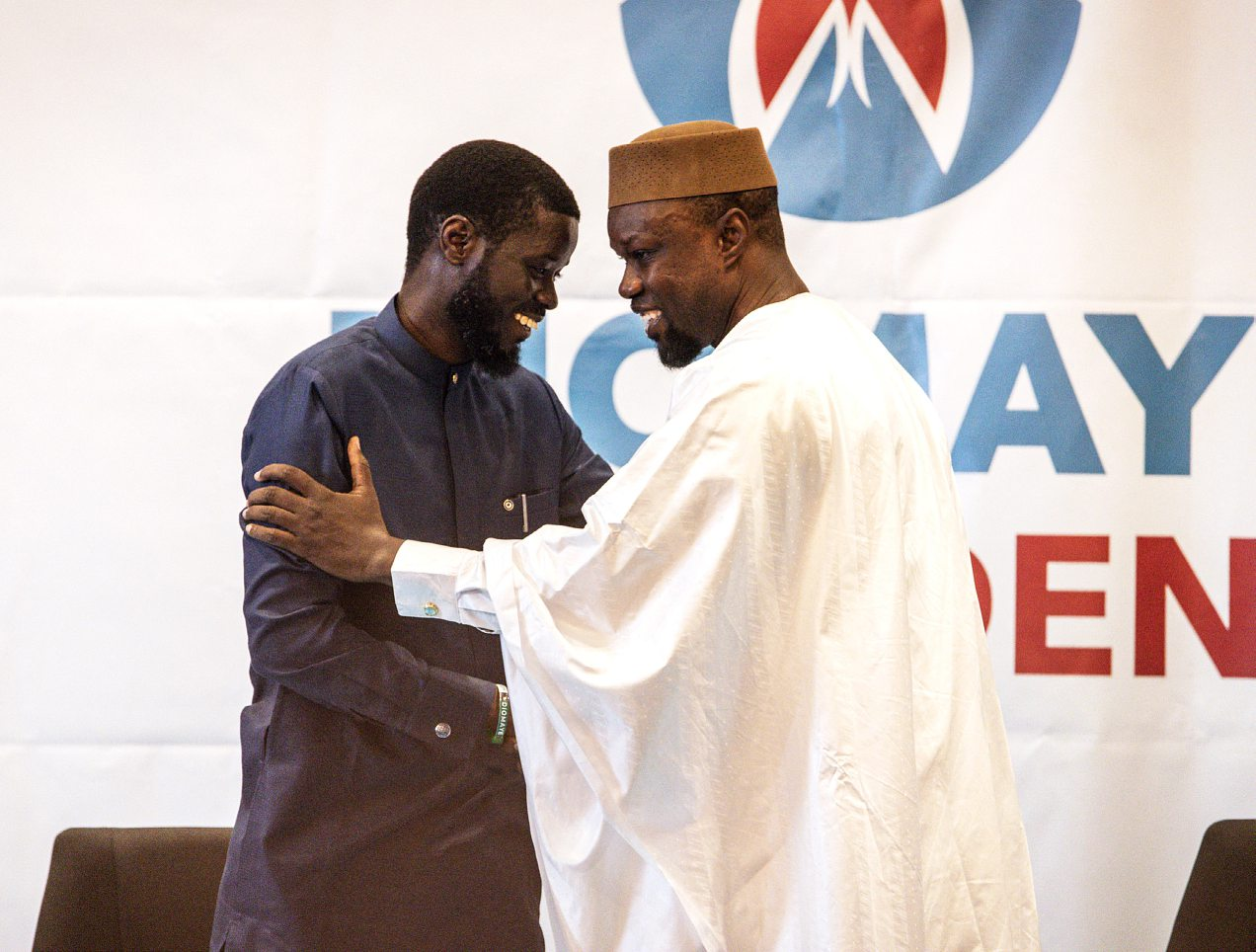
Nevertheless, the scenario is exceptional. On Tuesday 2 April, Ousmane Sonko was appointed Prime Minister. The 'duo' strategy is therefore being put in place. A duo that respects its shared history, a duo to change the country. The legitimacy of each is inextricably linked to that of the other. One needs the other, and vice versa. The human alliance is a powerful one. They have travelled a true odyssey together. They are like two sides of the same coin, brothers sworn to loyalty. They share traditional Serer and Diola customs and values. Diomaye even has a son called Ousmane. Yet the dangers are there, in the test of power, the test of time and ambitions. The historic number one becomes the operational number two. And hierarchy is a sensitive issue. By taking the reins of the executive, Sonko is directly exposing himself to the demands of the population, to the inevitable discontent. The Prime Minister is traditionally the preferred target. There is also the influence of private and public circles, and the weight of decisions to be taken and borne. And as the saying goes, there is only one presidential chair, there is no presidential bench. So, while the situation is unusual, it is not without its pitfalls.
MACKY’S MANOEUVRES
THE OTHER central, enigmatic figure in this presidential election is the man who, last July, abandoned his bid for a third term, and endorsed a successor, Amadou Ba, without ever really supporting him, playing, according to some, against his own camp. It was he who postponed the election three weeks before it was due to take place on 25 February, perhaps to save Karim Wade, still exiled in Doha, and reshuffle the cards. Then, a few days later, he complied with the Constitutional Council's decisions. Macky Sall, however, did not attend any rallies, nor did he campaign for his protégé, who had, moreover, been largely scuttled by other members of the ruling party. At the very end of this sequence, Macky had the Assembly pass an amnesty law, which freed not only Bassirou Diomaye Faye, but also Ousmane Sonko. A sort of coup de grace. And the rest of the story has now been written.
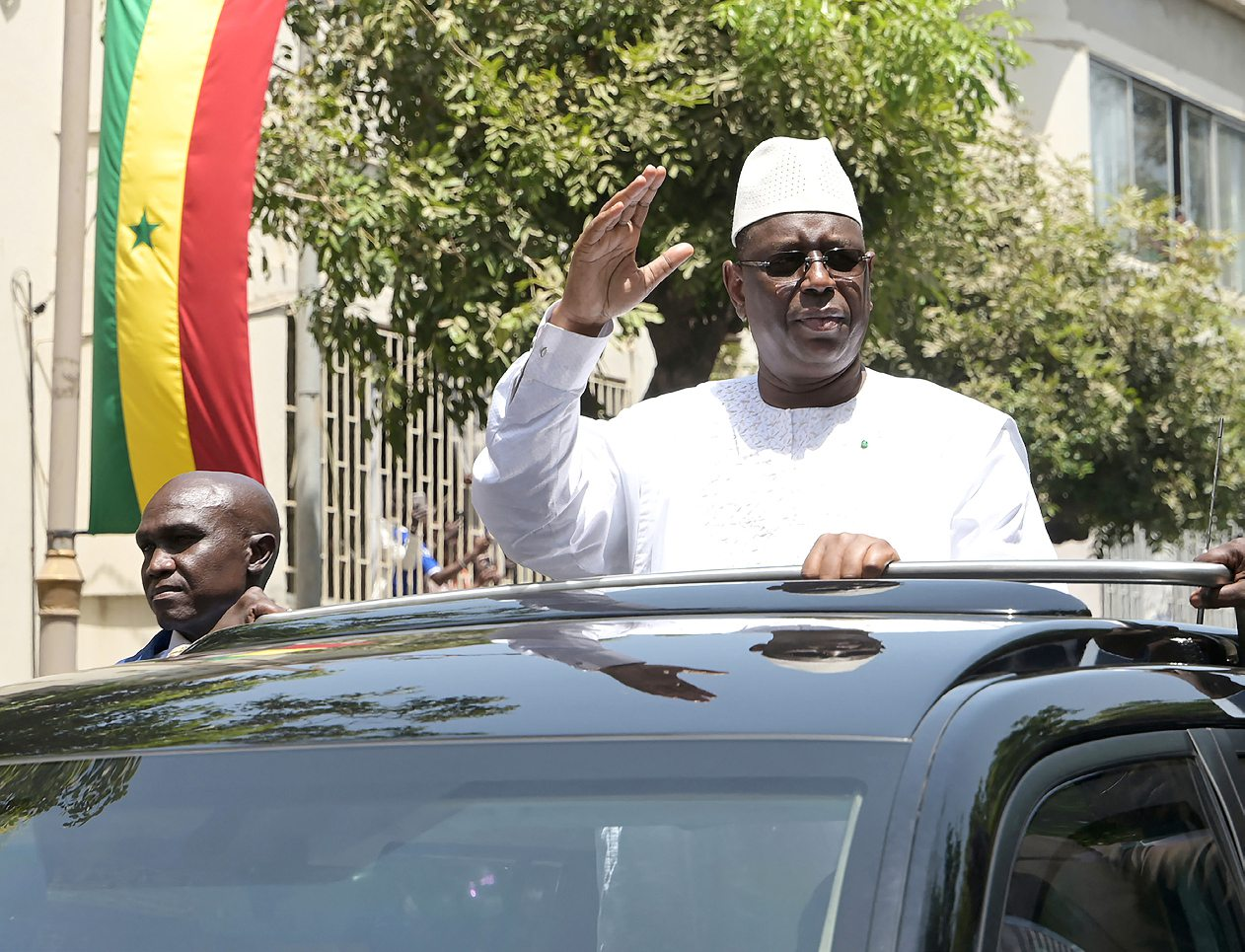
One day, no doubt, Macky Sall will speak out about the astonishing lead up to the defeat of his camp and the collapse of his party. But the story right now is that the President freed his main opponents, that the elections were held in complete transparency, that it was a calm and respectful transition, and that the Republic of Senegal was in tune with the majority of its fellow citizens. Macky Sall thus left after this strange defeat, which people believe he must have tried to control. Later, it will be time to take stock of the Sall decade. This geologist, himself from humble beginnings, sought to lift Senegal out of its quasi-structural poverty. Infrastructure projects have transformed the landscape. His Plan for an Emerging Senegal (PSE) set out an ambitious strategy. The progress made is undeniable. Sadly, it has not been enough, not by a long chalk.
MODEL OF DEMOCRACY
24 MARCH 2024 unfolded like any other day. No violence. Well organised. No chaos at the polling stations. Local and international observers. A relatively high turnout, almost 60%, even if it is not unprecedented (Wade won in 2007 with a turnout of 70%, and Macky Sall in 2019 with a turnout of 66%). The results were announced quickly, on television and radio, with few if any challenges. The media played their part. And a historic transition. But it's been a long road. Several years of tension between the government and PASTEF. From the postponement of the election just a few weeks before it was due to take place on 25 February. From a political and regulatory imbroglio in which the Constitutional Council, supposedly sympathetic to the outgoing coalition, ended up imposing its decisions. Clearly, despite everything, Senegal is holding its own as one of Africa's democratic exceptions. With, above all, a recurrent practice of peaceful political changeover. Abdou Diouf was defeated by Abdoulaye Wade in 2000, who in turn was defeated by Macky Sall in 2012. And now Macky Sall's candidate, Amadou Ba, has been beaten by a breakaway opponent in the first round in 2024.
The images are often beautiful and moving, with handshakes and friendly exchanges between outgoing and incoming candidates. Each time, the administration adapts to the change. The State stands firm and carries on. But while the Senegalese model is often held up as an example, it is not without its share of violence. Political crisis is as much a part of the Senegalese experience as democratic practice. Justice and prison have often been used to settle political scores. The hyper-personalisation of presidential power has been imposed since independence. As mentioned earlier, the confrontation between the government and PASTEF gave rise to days of rioting and numerous casualties. In 2019, Karim Wade and Khalifa Sall would not have been able to stand, as they were 'legally prevented' from doing so. In 2011, Wade (who himself had spent some time in prison during his predecessor's term) sought to impose a constitutional reform that would have opened the door to a third term in office, provoking anger in the streets. We also remember the 1993 assassination of Mr Babacar Sèye, then Vice-President of the Constitutional Council. Or the 1988 riots, with Dakar in a state of emergency after Abdou Diouf's re-election. And, back in 1963, how Senghor's first election led to riots, which left 40 demonstrators dead and 250 injured. Then came the confrontation between the poet-president and Mamadou Dia, who was sentenced to twenty years in prison.
SOCIAL DEMANDS, YOUNG POPULATION AND FRUSTRATION
THE CHALLENGE is huge. And it is central to the country's political and social issues. The victory of Diomaye Faye and Ousmane Sonko was built on these frustrations and expectations. Senegal is in a state of social emergency, despite the undeniable growth experienced during the Macky years. Between 2011 and 2022, after years of stagnation, per capita income (in purchasing power parity) rose from $2,791 to $3,565. The rate of extreme poverty (less than $2.15 a day) dropped sharply from 41% in 2008 to 9% in 2020. But this growth is not trickling down. The perception of an acute social crisis has not changed. Yes, GDP per capita is rising, but it is well below that of neighbouring countries such as Côte d'Ivoire and Ghana. The Human Development Index (HDI) has improved since 2011, but too slowly. Senegal is still classified as a ‘low-development’ country, ranking around 165th in the world.
This sense of social impasse is fuelled by the country's young population. The median age is 19, meaning that half the population is under that age. And 70% of Senegalese people are under the age of thirty. Every year, over 200,000 young graduates enter the job market. Many of them want a job, a place to live or to get married. Others, in desperation, set off in dug-out canoes, risking their lives. By 2030, the population is expected to reach 25 million. In Senegal, as elsewhere in Africa, those left behind by the emergence model have become a political force.
WALL OF ECONOMIC REALITY
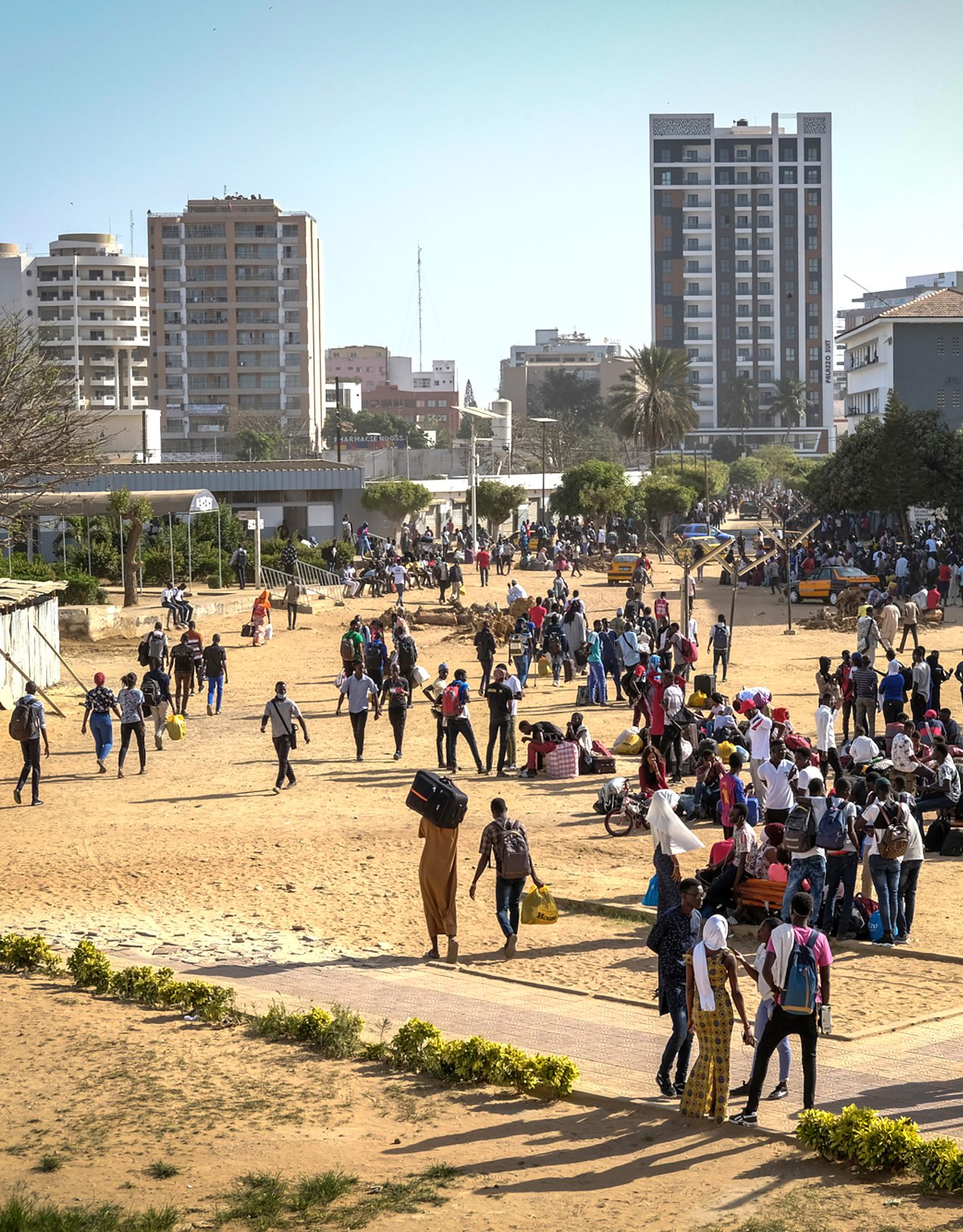
LOGICALLY, Diomaye Faye's programme seeks to respond to this social emergency. The strategy is to avoid falling into the trap of cleverly arranged continuity. The strategy is a break with the past, an ideology of disruption. It's about inventing a new development model, redesigning a blueprint for society, a framework for emergence that breaks away from the liberal framework that only benefits the elite. A model based on sovereignty and "Senegal Power". A force capable of making a difference. With ideas that are both bold and obvious. Fighting corruption, creating a million jobs, promoting import substitution policies, particularly in agriculture, expanding fishing zones, promoting industry, launching construction of a new capital, renegotiating oil and gas contracts, disengaging from too close a relationship with Western partners, imposing win-win partnerships with businesses, particularly French and foreign. And, symbol among symbols for the country that is home to the WAEMU Central Bank, gradually and eventually disengage from the CFA franc system, fostering the emergence of a regional currency backed by ECOWAS.
It all sounds very appealing, or at least worth discussing. But the menu is somewhat gargantuan, and the economy has its restrictive realities. The PASTEF programme comes at a colossal cost, requiring human, technical and financial resources beyond the country's reach. Senegal remains poor, economically fragile, indebted to the tune of 75% of GDP, which itself amounts to $29 billion, making the nation the nineteenth largest economy on the continent, a long way from Ghana, Côte d'Ivoire, and Kenya, etc. Senegal has assets, talent and intelligence, but it needs external funding, investment, active support and confident businesses, particularly to create jobs. To succeed (and the term of office is only five years), Diomaye Faye and his teams will have to be both bold –so as to satisfy their voters – and pragmatic and sensible, so as to avoid a sudden turnaround. As someone close to PASTEF pointed out, “the conquest of power and the exercise of power are very different things.”
IN SEARCH OF NEW ALLIANCES
THEY are the leaders of the country. They are young, often schooled and trained in their own country, with a strong Senegalese and African identity, a more detached and straightforward relationship with the world's major capitals and comfortable travel. They have been praised from Washington to Beijing, via Moscow and Paris. We are trying to decipher the intentions of this new power. President Diomaye Faye spoke of respectful and balanced relations with Paris. Paris responded with an eager call from President Macron, anxious not to miss this train of change. In the circles close to the presidency, on the Plateau, security relations with Russia and a new partnership with China are not being ruled out. This is sure to raise eyebrows in the United States. The movement's leaders make no secret of their desire to transform regional organisations such as ECOWAS and WAEMU, to forge closer ties with Sahel juntas and to re-establish dialogue. There are certainly bridges, particularly on the vague but popular theme of sovereignty. However, Dakar's message is also one of emancipation through democracy, through the vote, and this can only speak to the masses in Bamako, Ouagadougou and Niamey. It can only upset the military. This message of power change, youth and identity is bound to resonate elsewhere, in an Africa in search of new democratic models. And in Western capitals, which will have to adapt to this history in the making. But to change Senegal, to shake things up, there will have to be discussions with others. Between Dakar and the big boys of the world, but above all between Dakar and its close and different neighbours: Dakar and Nouakchott, Dakar and Abidjan, above all. Between younger brothers and older brothers. The boat will surely rock, things will change, nothing will be easy. But it will be worth it.
FIRST WEEKS, FIRST MONTHS
THE PRESIDENT has set a very ambitious programme. The Prime Minister has been appointed. The country is waiting for a big night, for a major transformation, for a new Senegal to come into being. Expectations will have to be met quickly. Make the change tangible in one way or another. Take measures that are both symbolic and strong, and make the most of the ‘hundred-day’ window, that short space of time when almost anything is possible. While the party's leaders are often referred to as ‘inexperienced’, they have since managed to win over some of the administration and executives, in both the private and public sectors. There is no shortage of ‘external’ human resources. And one of the keys to the period ahead will be to strike a balance between pure political figures, preoccupied with ideology and sometimes revenge, and the ‘technos’ who will try to put the promises of the new government into practice. Last-minute allies and friends of Karim Wade will also have to be satisfied, and the scattered remnants of the other opposition groups that were swept aside at the ballot box may have to be brought together. The new government will provide valuable insights into these new balances.
The political terrain ahead will be complex. The duo is expected to make their move, as befits a democracy. PASTEF was dissolved by decree last July. It will have to be reinstated. The new government will also have to deal with a National Assembly dominated by the rival Benno Bokk Yakaar coalition, which supports Amadou Ba. The Constitution allows the President to dissolve the Assembly at the end of a two-year period following his inauguration, i.e. in five months' time. This would lead to early legislative elections. And therefore a new political debate. To move forward in the meantime, to legislate, it will probably be necessary to negotiate. Amadou Ba himself, with his 30% plus in the first round, will carry weight in the political landscape if he so wishes, which remains a question at the time of writing, and if the former presidential party survives the debacle. As is often the case, the way in which power is exercised will be crucial. While we wait for the ‘big night’, the break with the past would be to govern differently. Valuing skills, breaking away from the traditional circuits of clientelism, promoting budgetary and financial transparency, resource management, strengthening the essential pillar of justice. Opening up to civil society. With, as a backdrop, the mother of all reforms, which would be to promote a more decentralised, more institutional approach to power, one that emancipates itself from hyper-presidentialism, from the notion that one man, or one woman, can be the centre of everything.
NEW STYLE DAKAR
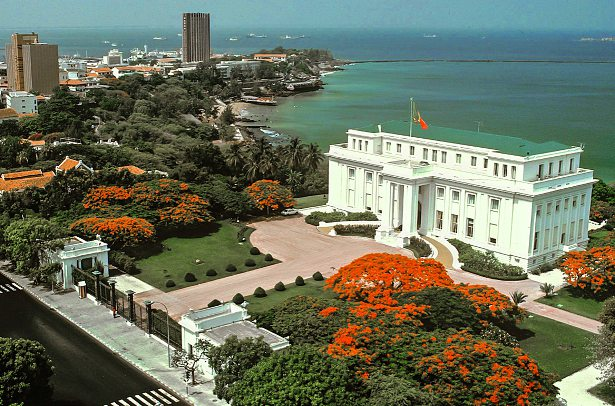
THE TOPOGRAPHY is both stressful and symbolic, with its hypercentre, the Plateau district, wedged into the Cape Verde peninsula, and its sprawling suburbs, so near and so far, whose names resonate in the collective imagination. Guédiawaye, Pikine, Rufisque, Thiaroye... In the centre, there is this straight line, the TER regional express train, one of the emblematic projects of the Sall era. In the distance, there's Diamniadio, the new town dream, and Blaise Diagne airport with its futuristic design. In this urban mash-up, everything collides: wealth and poverty, ambition and suffering, handcarts and gleaming saloons. This is Dakar, rebellious and bourgeois, an urban mirror of Senegal's challenges. One of President Maky Sall's last symbolic acts was to relaunch the old Gorée memorial project on the Corniche. To mark the passage of history, to make a link with the new generations. Energised by the change underway (the town voted massively for Diomaye Faye), the capital now sees itself as an intellectual, political and artistic city. Every day, it strives to establish itself as the epicentre of ‘African reform’. We can expect to see all the continent's ‘Pastefian’ apprentices arriving, eager to learn and, probably, to be supported. We are also waiting to see what the relationship will be between the new guard and the highly influential and exacting circle of Senegalese civil society, authors and writers. Will free and bold debate prevail? We're waiting to see whether the city will remain as open to world influences as ever. In the short term, we can't wait to experience the atmosphere at the Contemporary African Art Biennial, which opens in mid-May 2024. Which reminds us that in 2026, the city will host the Summer Youth Olympic Games, the first Olympic event ever held in Africa.
AND NOW?
REUNITING ALL THOSE Senegalese citizens who have been divided and at each other's throats is essential. Eradicate the remnants of PASTEF's culture of insurrection, of ‘counter-violence’ (and of witch hunts, especially on social media). Move towards an institutional party, a constructive party, a party in government, committed to bringing people together. Senegal needs peace and harmony if it is to continue moving forward. Idealism is not necessarily the best solution for promoting growth, nor the best solution for surviving in the jungle of international relations. Duos are not necessarily ideal for governing a country. Changing the world, changing Africa, changing Senegal will not happen overnight. But whether we agree or disagree ideologically, it is in the interests of the country that Diomaye Faye and his party’s ‘Sonkoism’ don't run out of steam.
Deep down, something more avant-garde and historic is at play in Dakar. A phenomenon that goes beyond party politics and rallying slogans. It's a kind of revolution, a move from one era into another, from one generational line to another, like a new chapter in the very long history of decolonisation, a new attempt to give concrete meaning to the independence and authenticity that people have been seeking for so long. For Bassirou Diomaye Faye and Ousmane Sonko, the challenge is ambitious and risky.